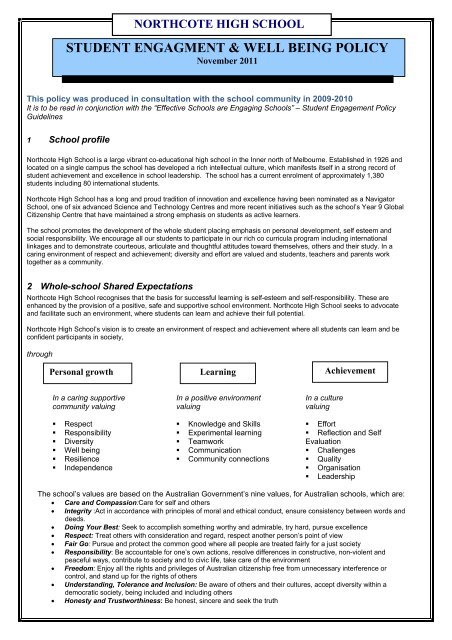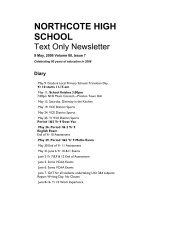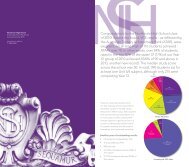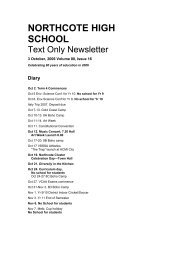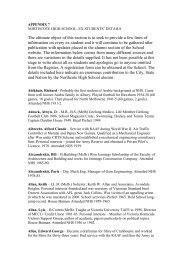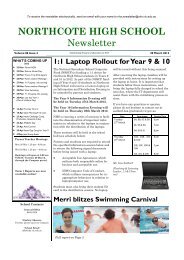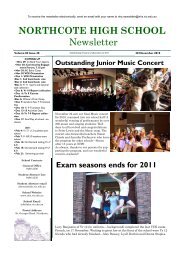student engagment & well being policy - Northcote High School
student engagment & well being policy - Northcote High School
student engagment & well being policy - Northcote High School
You also want an ePaper? Increase the reach of your titles
YUMPU automatically turns print PDFs into web optimized ePapers that Google loves.
NORTHCOTE HIGH SCHOOL<br />
STUDENT ENGAGMENT & WELL BEING POLICY<br />
November 2011<br />
This <strong>policy</strong> was produced in consultation with the school community in 2009-2010<br />
It is to be read in conjunction with the “Effective <strong>School</strong>s are Engaging <strong>School</strong>s” – Student Engagement Policy<br />
Guidelines<br />
1 <strong>School</strong> profile<br />
<strong>Northcote</strong> <strong>High</strong> <strong>School</strong> is a large vibrant co-educational high school in the Inner north of Melbourne. Established in 1926 and<br />
located on a single campus the school has developed a rich intellectual culture, which manifests itself in a strong record of<br />
<strong>student</strong> achievement and excellence in school leadership. The school has a current enrolment of approximately 1,380<br />
<strong>student</strong>s including 80 international <strong>student</strong>s.<br />
<strong>Northcote</strong> <strong>High</strong> <strong>School</strong> has a long and proud tradition of innovation and excellence having been nominated as a Navigator<br />
<strong>School</strong>, one of six advanced Science and Technology Centres and more recent initiatives such as the school’s Year 9 Global<br />
Citizenship Centre that have maintained a strong emphasis on <strong>student</strong>s as active learners.<br />
The school promotes the development of the whole <strong>student</strong> placing emphasis on personal development, self esteem and<br />
social responsibility. We encourage all our <strong>student</strong>s to participate in our rich co curricula program including international<br />
linkages and to demonstrate courteous, articulate and thoughtful attitudes toward themselves, others and their study. In a<br />
caring environment of respect and achievement; diversity and effort are valued and <strong>student</strong>s, teachers and parents work<br />
together as a community.<br />
2 Whole-school Shared Expectations<br />
<strong>Northcote</strong> <strong>High</strong> <strong>School</strong> recognises that the basis for successful learning is self-esteem and self-responsibility. These are<br />
enhanced by the provision of a positive, safe and supportive school environment. <strong>Northcote</strong> <strong>High</strong> <strong>School</strong> seeks to advocate<br />
and facilitate such an environment, where <strong>student</strong>s can learn and achieve their full potential.<br />
<strong>Northcote</strong> <strong>High</strong> <strong>School</strong>’s vision is to create an environment of respect and achievement where all <strong>student</strong>s can learn and be<br />
confident participants in society,<br />
through<br />
Personal growth<br />
Learning<br />
Achievement<br />
In a caring supportive<br />
community valuing<br />
In a positive environment<br />
valuing<br />
In a culture<br />
valuing<br />
• Respect • Knowledge and Skills • Effort<br />
• Responsibility<br />
• Experimental learning<br />
• Reflection and Self<br />
• Diversity<br />
• Teamwork<br />
Evaluation<br />
• Well <strong>being</strong> • Communication • Challenges<br />
• Resilience • Community connections • Quality<br />
• Independence • Organisation<br />
• Leadership<br />
The school’s values are based on the Australian Government’s nine values, for Australian schools, which are:<br />
• Care and Compassion:Care for self and others<br />
• Integrity :Act in accordance with principles of moral and ethical conduct, ensure consistency between words and<br />
deeds.<br />
• Doing Your Best: Seek to accomplish something worthy and admirable, try hard, pursue excellence<br />
• Respect: Treat others with consideration and regard, respect another person’s point of view<br />
• Fair Go: Pursue and protect the common good where all people are treated fairly for a just society<br />
• Responsibility: Be accountable for one’s own actions, resolve differences in constructive, non-violent and<br />
peaceful ways, contribute to society and to civic life, take care of the environment<br />
• Freedom: Enjoy all the rights and privileges of Australian citizenship free from unnecessary interference or<br />
control, and stand up for the rights of others<br />
• Understanding, Tolerance and Inclusion: Be aware of others and their cultures, accept diversity within a<br />
democratic society, <strong>being</strong> included and including others<br />
• Honesty and Trustworthiness: Be honest, sincere and seek the truth
3. Rights and responsibilities<br />
3.1 Guiding principles<br />
• All members of the school community are to be valued and treated with respect.<br />
• Students have a right to work in a secure environment where, without intimidation, bullying or<br />
harassment, they are able to fully develop their talents, interests and ambitions.<br />
• Parents have a right to expect that their children will be educated in a secure environment in which<br />
care, courtesy and respect for the rights of others are encouraged.<br />
• Teachers have a right to expect that they will be able to teach in an orderly and cooperative<br />
environment.<br />
• Parents have an obligation to support the school in its efforts to maintain a positive teaching and<br />
learning environment.<br />
• Principals and staff have an obligation to fairly and consistently implement all aspects of the <strong>policy</strong><br />
3.2 Equal Opportunity Act 2005<br />
The Equal Opportunity Act 1995 sets out the types or grounds of discrimination that are unlawful and aims to<br />
promote community recognition and acceptance of the equality of men and women, and the equality of people of<br />
all races, regardless of their religious or political convictions, their impairments or their age.<br />
Under the act it is unlawful to discriminate against a person on the basis of the following attributes: age,<br />
breastfeeding, gender identity, impairment, industrial activity, lawful sexual activity, marital status, parental status<br />
or status as carer, physical features, political belief or activity, pregnancy, race, religious belief or activity, sex,<br />
sexual orientation, personal association (with a person who is identified by reference to any of the above<br />
attributes).<br />
3.3 The Charter of Human Rights and Responsibilities Act 2006<br />
The Charter sets out a list of 20 rights that reflect the following four basic principles:<br />
Freedom, Respect, Equality, Dignity<br />
The charter outlines a vision of human rights for all Victorians. The charter affirms that all people are born free<br />
and equal in dignity and rights. While the charter demands equality for all, it also emphasises the value of<br />
difference. The charter requires public authorities, including government schools and their employees, to act<br />
compatibly with human rights and to consider human rights when making decisions and delivering services. The<br />
Act identifies the right not to be discriminated against; the right to privacy and reputation; the right to freedom of<br />
thought, conscience, religion and belief; and Cultural Rights<br />
It is important to understand that with human rights comes a responsibility to respect other human rights.<br />
3.4 Students with disabilities<br />
The Disability Standards for Education 2005 clarify and make more explicit the obligations on schools and the<br />
rights of <strong>student</strong>s under the Disability Discrimination Act 1992. The standards cover enrolment, participation,<br />
curriculum development, <strong>student</strong> support services, and harassment and victimisation.<br />
3.5 Bullying and harassment<br />
What is it?<br />
Harassment is any verbal, physical or sexual conduct (including gestures) which is uninvited, unwelcome or<br />
offensive to a person.<br />
Bullying is repeated oppression, physical or psychological, of a less powerful person by a more powerful person<br />
or group.<br />
Cyberbullying is a form of bullying which is carried out through an internet service such as email, chat room,<br />
discussion group, online social networking, instant messaging or web pages. It can also include bullying through<br />
mobile phone technologies such as SMS. It may involve text or images (photos, drawings)<br />
Examples of cyberbullying behaviour are:<br />
• teasing and <strong>being</strong> made fun of<br />
• spreading of rumours online<br />
• sending unwanted messages<br />
• defamation.<br />
<strong>Northcote</strong> <strong>High</strong> <strong>School</strong> has a <strong>policy</strong> that deals directly with bullying and harrassment
3.6. Rights and Responsibilities of Students at <strong>Northcote</strong> <strong>High</strong> <strong>School</strong><br />
Rights<br />
All <strong>student</strong>s at <strong>Northcote</strong> <strong>High</strong> <strong>School</strong> have<br />
the following rights<br />
• To enjoy a safe, healthy and nondiscriminatory<br />
environment.<br />
• To be treated and respected as people<br />
engaged in a significant enterprise, by all<br />
members of the school community.<br />
• To receive opportunities for personal and<br />
career development.<br />
• To receive guidance and support from<br />
teachers in their studies.<br />
• To be kept informed of their educational<br />
progress.<br />
Responsibilities<br />
All <strong>student</strong>s at <strong>Northcote</strong> <strong>High</strong> <strong>School</strong><br />
have the following responsibilities<br />
• To be courteous to all members of staff,<br />
to each other and to visitors to the<br />
school.<br />
• To cooperate in the development and<br />
maintenance of a safe learning<br />
environment free of physical, sexual,<br />
racial, cultural or religious harassment<br />
or violence.<br />
• To comply with requirements of the<br />
school in all matters regarding<br />
attendance, uniform and assessment<br />
practices.<br />
• To respect their own property, the<br />
property of others and the school.<br />
• To respect the educational opportunities<br />
of other <strong>student</strong>s at all times.<br />
• To respect the safety and rights of other<br />
<strong>student</strong>s and the broader community in<br />
all actions.<br />
The school regards this code as<br />
applying to all <strong>student</strong>s at (or near) the<br />
<strong>School</strong> or any event, whether officially<br />
"present for the day" or not, and on their<br />
way to and from school, and during all<br />
hours while on school premises<br />
(including holidays and evenings).<br />
3.7. Rights and Responsibilities of Parents/carers<br />
Rights<br />
• parents/carers have a right to expect that<br />
their children will be educated in a secure<br />
environment in which care, courtesy and<br />
respect for the rights of others are<br />
encouraged<br />
Responsibilities<br />
Parents/carers have a responsibility to:<br />
• promote positive educational outcomes<br />
for their children by taking an active<br />
interest in their child’s educational<br />
progress and by modeling positive<br />
behaviours.<br />
• Ensure their child’s regular attendance<br />
• Engage in regular and constructive<br />
communication with school staff regarding<br />
their child’s learning.<br />
• support the school in maintaining a safe<br />
and respectful learning environment for all<br />
<strong>student</strong>s.
3.8. Rights and Responsibilities of Teachers<br />
Rights<br />
Teachers have a right to<br />
• expect that they will be able to teach in an<br />
orderly and cooperative environment<br />
• be informed, within Privacy requirements,<br />
about matters relating to <strong>student</strong>s that will<br />
affect the teaching and learning program for<br />
that <strong>student</strong><br />
Responsibilities<br />
Teachers have a responsibility to<br />
• fairly, reasonably and consistently,<br />
implement the <strong>well</strong><strong>being</strong> and engagement<br />
<strong>policy</strong>.<br />
• Know how <strong>student</strong>s learn and how to<br />
teach them effectively.<br />
• Know the content they teach.<br />
• Know their <strong>student</strong>s.<br />
• Plan and assess for effective learning.<br />
• Create and maintain safe and challenging<br />
learning environments.<br />
• Use a range of teaching strategies and<br />
resources to engage <strong>student</strong>s in effective<br />
learning.<br />
3.9. <strong>School</strong>s – principals, teachers and school staff<br />
<strong>School</strong>s have a responsibility to provide an educational environment that ensures that all <strong>student</strong>s are valued and<br />
cared for, feel they are part of the school, and can engage effectively in their learning and experience success.<br />
<strong>School</strong> expectations include:<br />
• inclusive teaching practices<br />
• accessible educational provision for all <strong>student</strong>s<br />
• parent/carer partnerships and liaison<br />
• community partnerships which engage families and the community in ways that support <strong>student</strong><br />
achievement and success<br />
• provision of appropriate <strong>student</strong> services<br />
• development and provision of appropriate, relevant and challenging curriculum that gives <strong>student</strong>s the<br />
opportunity to experience success in their learning.<br />
4. Choice Theory and Restorative Practices<br />
<strong>Northcote</strong> <strong>High</strong> <strong>School</strong> is committed to the use of Choice theory and restorative practices with <strong>student</strong>s.<br />
Restorative Practices:<br />
• are underpinned by <strong>student</strong> learning and facilitate an environment of safety, trust and connectedness<br />
promote awareness of others, responsibility and empathy<br />
• involve direct and voluntary participation of those affected by misconduct in its resolution<br />
• promote relationship management rather than behaviour management<br />
• separate the deed from the doer<br />
• are systematic, not situational<br />
• are concerned with establishing or re-establishing social equality in relationships; that is, relationships in<br />
which each person’s rights to equal dignity, concern and respect are satisfied.<br />
5. <strong>School</strong> actions and consequences (for most matters, including bullying)<br />
Student engagement, regular attendance and positive behaviours will be supported through relationship based<br />
whole-school and classroom practices, including:<br />
• establishing predictable, fair and democratic classrooms and school environments<br />
• ensuring <strong>student</strong> participation in the development of classroom and wholeschool expectations<br />
• providing personalised learning programs where appropriate for individual <strong>student</strong>s<br />
• consistently acknowledging all <strong>student</strong>s<br />
• empowering <strong>student</strong>s by creating multiple opportunities for them to take responsibility and be involved in<br />
decision-making<br />
• providing physical environments conducive to positive behaviours and effective engagement in learning<br />
Inappropriate behaviours, including anti social and disruptive behaviours, irregular attendance, will be
esponded to through a staged response, including:<br />
• understanding the <strong>student</strong>’s background and needs<br />
• ensuring a clear understanding of expectations<br />
• providing consistent school and classroom environments<br />
• scaffolding the <strong>student</strong>’s learning program.<br />
Broader support strategies will include:<br />
• involving and supporting the parents/carers,<br />
• involving the <strong>student</strong> <strong>well</strong><strong>being</strong> coordinator, managed individual pathways or careers coordinators<br />
• mentoring and/or counselling<br />
• convening <strong>student</strong> support group meetings<br />
• where appropriate developing individualised learning plans<br />
• providing access to other educational programs<br />
• involving community support agencies.<br />
6. Discipline procedures<br />
<strong>School</strong> consequences which may be used prior to or instead of suspension include:<br />
• Consultation with Teacher<br />
• Withdrawal of privileges (eg attending camp or excursions)<br />
• Withdrawal from class if a <strong>student</strong>’s behaviour significantly interferes with the rights of other <strong>student</strong>s to<br />
learn.<br />
• Contract developed and signed<br />
• Referral to Student Well<strong>being</strong> Team<br />
• Environmental service within the school<br />
• Payment for damages<br />
• Detention - teachers may require a <strong>student</strong> to finish school work that has not been completed in the regular<br />
classroom or to undertake additional or new work or duties at a reasonable time and place. Up to half the time<br />
allocated for any recess or lunch may be used for this work.<br />
Where <strong>student</strong>s are required to undertake school work after school, the time will be a maximum of forty-five<br />
minutes. The Principal or Year Level Program Leader (YLPL) will ensure that parents/carers are informed at<br />
least the day before an after school detention.<br />
• Convening of a support group.<br />
7. <strong>School</strong> Rules<br />
GENERAL BEHAVIOUR<br />
It is expected that the <strong>student</strong>s of this school will always behave in a polite manner towards each other, the<br />
staff and the general public. Students should remember that they are representatives of <strong>Northcote</strong> <strong>High</strong><br />
<strong>School</strong> and, as such, should behave correctly at school, coming to school and going home. When <strong>student</strong>s are<br />
using the road crossing at the front of the school, they must obey traffic signals and the instructions of the<br />
Crossing Supervisors.<br />
CLASSROOM BEHAVIOUR<br />
The four rules for all classes are that <strong>student</strong>s are required to:<br />
(a) Be on time<br />
(c) Follow given instructions<br />
(b) Be prepared for work<br />
(d) Respect right and property of others<br />
BEHAVIOUIR ON PUBLIC TRANSPORT<br />
Students must show consideration for the public and behave sensibly on trams, trains and buses. Students<br />
must line up quietly and wait for trams to stop before moving to board. There must be no running, pushing or<br />
foolish behaviour. Students must move right inside passenger compartments and not block the doorways.<br />
Bad language should not be used at any time and especially not on public transport.
BEHAVIOUR ON EXCURSIONS<br />
Students must obey all instructions of teachers while attending excursions. As representatives of the school,<br />
the very highest standards of behaviour are expected. The must be no running, pushing or loud talk and the<br />
public must be treated with courtesy. Senior <strong>student</strong>s on unaccompanied excursions must behave sensibly,<br />
speak politely and present themselves and the school in the best possible light.<br />
CARE OF PROPERTY<br />
Students should take pride in the school. It is the responsibility of each <strong>student</strong> to take care of the buildings,<br />
its furniture, garden areas and lockers and <strong>student</strong>s should, at all times, show respect for the property of<br />
others.<br />
AREAS OUT OF BOUNDS<br />
(a) Merri Creek.<br />
(b) The extreme boarders of the Merri Park (treed areas) and Sumner Avenue, including the council toilet<br />
block and the area of the baseball Clubrooms.<br />
(c) The front of the school and the car parks. When <strong>student</strong>s are moving to and from classes in the Arts<br />
Centre, <strong>student</strong>s must stay away from cars. The tram stop is out of bounds except when <strong>student</strong>s are waiting<br />
to catch a tram.<br />
(d) Staffrooms and the hall (unless accompanied by a teacher).<br />
(e) The playground area in merri Park. The equipment is designed for children of junior primary school age.<br />
GENERAL RULES<br />
• Spirit –based marker pens, white0out, laser pointer and glass bottles may not be brought in the school.<br />
• Je<strong>well</strong>ery and make-up should be unobtrusive.<br />
• Je<strong>well</strong>ery should not be worn in Physical Education, Sport and practical classes.<br />
• The chewing of gum is not permitted<br />
• If any staff member requests a <strong>student</strong> to identify him/herself, the <strong>student</strong>s must promptly supply the<br />
correct name and form.<br />
• Skateboards or roller blades may not be used in the school grounds or buildings<br />
• Students requiring a bag pass or uniform pass must obtain one from the YLPL before school.<br />
• The Student Planner is for recording homework and other school uses only<br />
• Only official <strong>Northcote</strong> <strong>High</strong> school caps or hats may be brought to school or worn in the school grounds.<br />
No hat or cap may be worn in the Library or classroom.<br />
• Razor or Razor type scooters must not be brought to school.<br />
• Under no circumstances are <strong>student</strong>s to invite outsiders onto the school property or its environs.<br />
MOVEMENT IN THE BUILDING<br />
Students should keep to the left and avoid running and unnecessary noise. Students are required to line up<br />
quietly while awaiting the teacher’s arrival, avoid blocking the corridors and not to be in rooms unless given a<br />
teacher’s permission.<br />
For safety, <strong>student</strong>s are not permitted to sit in narrow corridors.<br />
FIGHTING<br />
Fighting, violence, and the use of abusive language are strictly forbidden. In the event of dispute, under no<br />
circumstances are <strong>student</strong>s ever permitted to invite outsiders to the school. Carrying any type of weapon is<br />
prohibited strictly and is illegal. The throwing of objects in the grounds or classroom is also expressly<br />
forbidden. Students are made aware that the use of foul or bad language is illegal in public. Students must<br />
not use foul or offensive language at any time at school or while coming to and from school.<br />
LEAVING THE SCHOOL OR THE CLASSROOM<br />
No <strong>student</strong> is to leave the school early without producing a note to obtain permission and signing the Early<br />
Leaver’s Book in the library. A <strong>student</strong> may only leave the classroom with the teacher’s permission. The<br />
teacher will issue an “Out of Class” pass.<br />
LATENESS<br />
Punctuality is important. Classes commence 9:00am Students must be punctual to all classes. Late comers<br />
to school must sign in at the Library. Students who have been warned about lateness will have parents<br />
contacted, and consequences will result.<br />
ABSENCE<br />
Parents should approve their son or daughter’s absence online through the Compass parent portal, using the<br />
unique log in code and password.
LITTER<br />
Students should endeavour to see that our working environment is clean and tidy. Rubbish should be placed<br />
in bins provided in the yard, corridors and classroom. Students should take a responsible attitude and not<br />
drop litter in Merri Park or in the street near the school.<br />
LOCKERS<br />
Lockers are to be kept tidy and locked. Students are not to go to their lockers during class and should collect<br />
their books and other requirement prior to school, at the conclusion of recess, after lunch and at the end of the<br />
school day. Bags are to be left in lockers. Property should be placed inside lockers or deposited with the<br />
Assistant Principals for safe keeping.<br />
DETENTIONS<br />
Students who break <strong>School</strong> rules may be detained for up to 45 minutes at the end of the school day.<br />
STUDENT CARS<br />
Student parking is not available within the school grounds. Students driving to school or during the school day<br />
may not carry passengers. P Plate drivers are reminded of laws governing numbers of passengers who may<br />
be carried.<br />
SMOKING<br />
Smoking by <strong>student</strong>s at any level is not permitted in the buildings, grounds or coming to or from school, nor<br />
are they to have possession of cigarettes, matches or lighters.<br />
VISITORS<br />
Visitors and ex-<strong>student</strong>s may not enter the grounds or buildings without obtaining a visitor’s pass from the<br />
General Office.<br />
REFERENCES<br />
Students seeking references may obtain an application from the Principal or General Office. Students must<br />
allow at least two days for the preparation of the reference.<br />
MUSIC PLAYERS AND MOBILE PHONES<br />
Phone, iPods, MP3 and other music players may not be used in the classroom without a teacher’s permission<br />
and must not be used in a manner that disrupts the learning process. The school takes no responsibility for<br />
lost or stolen phones or music players. For safety reasons (eg. Awareness of traffic and trams) <strong>student</strong>s<br />
should not use music players while travelling to and from school. Camera phones must not be used to take<br />
photos of others at school without their permission.<br />
8. Suspension and expulsion<br />
A <strong>student</strong> may be excluded from school in situations where other measures have been implemented without<br />
success. These include behaving in a manner that constitutes a danger to the physical and emotional health of<br />
any staff member or pupil. A <strong>student</strong> may also be excluded where an immediate response is the only<br />
appropriate course of action in response to the <strong>student</strong>’s behaviour.<br />
The following are regarded as serious breaches of school rules that may require suspension or expulsion:<br />
a) Threatening or constituting a danger to the health safety or <strong>well</strong><strong>being</strong> of any person<br />
b) Committing an act of significant violence against a person or cause significant damage to or destruction of<br />
property, knowingly involved in theft of property<br />
c) possessing, using or deliberately assisting another person to use prohibited drugs, alcohol or substances<br />
d) failing to comply with any reasonable and clearly communicated instruction of a principal, teacher or other<br />
member of staff.<br />
e) consistently interfering with the <strong>well</strong><strong>being</strong>, safety or educational opportunities of any other <strong>student</strong><br />
f) consistently vilifing, defaming, degrading or humiliating another person


